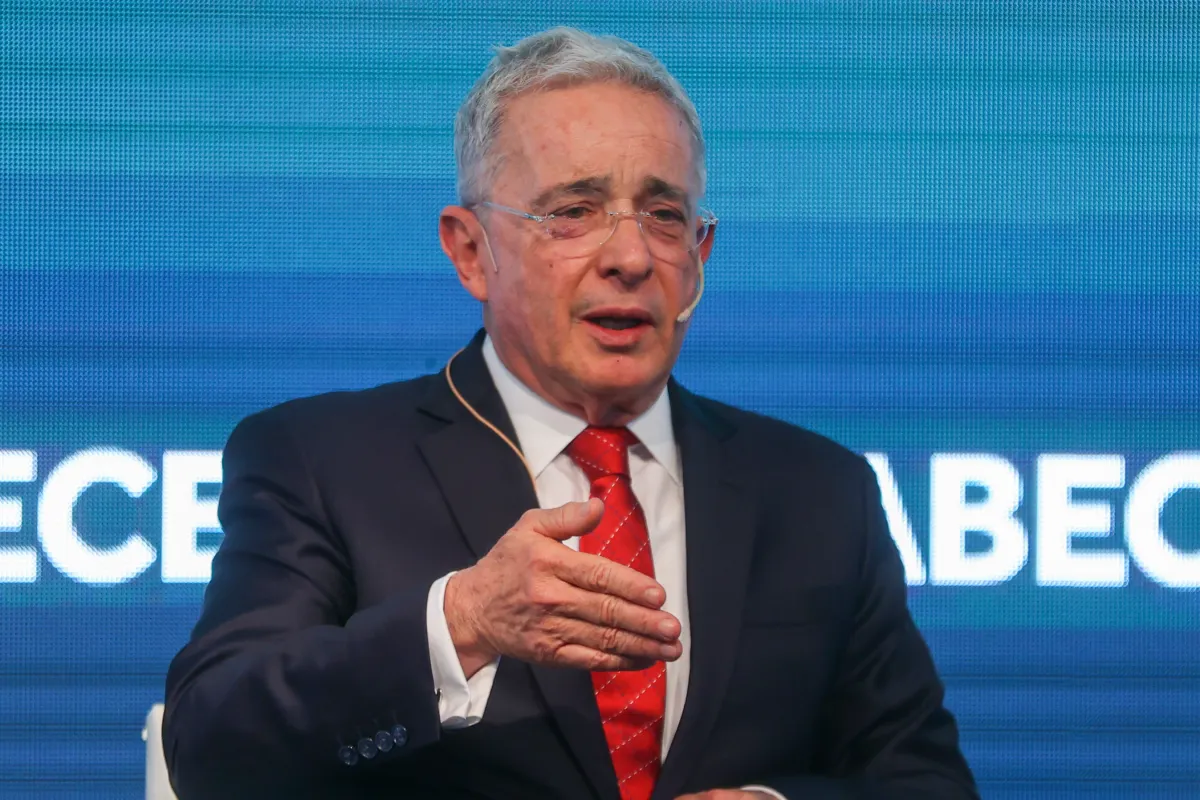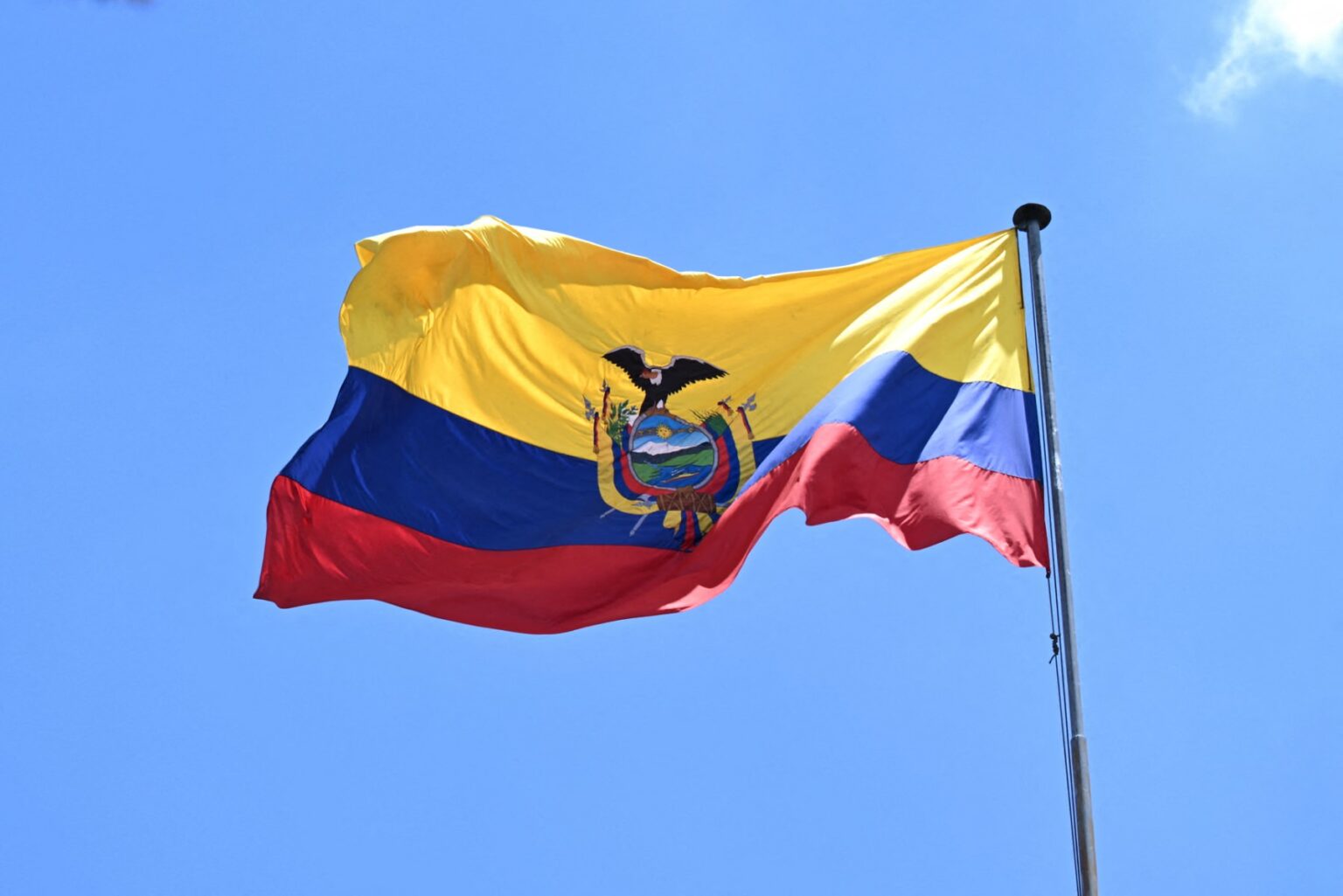International
Álvaro Uribe, former president of Colombia, affirms that the trial against him has political motivations

Former Colombian President Álvaro Uribe (2002-2010) said on Wednesday that the trial to which he will be called for the crimes of bribery of witnesses in criminal action and procedural fraud has political motivations and lacks evidence against him.
“This trial is brought forward for political presumptions, for personal deception, for political revenge, without evidence to infer that I sought to bribe witnesses or deceive justice,” Uribe said in a statement read on his social networks.
The Prosecutor’s Office yesterday made an accusation against Uribe “as an alleged determiner of the crimes of bribery of witnesses in criminal proceedings and procedural fraud,” in a case that began in 2012 with a complaint against the left-wing senator Iván Cepeda and that, like a boomerang, was returned against him.
Uribe denied that he knew or had had contacts with several criminals cited in the process, some of them prisoners, whom lawyer Diego Cadena allegedly contacted to testify against Cepeda.
“I always asked for the truth, I never asked to lie or shut up,” said the former president and leader of the right-wing party Centro Democrático, who added: “I have never involved people in crime, except people of my children’s age.”
Uribe’s lawsuit against Cepeda, a senator who today is part of the ruling coalition Historical Pact, sought to demonstrate an alleged manipulation of witnesses in a complaint that he prepared 14 years ago in Congress against the former president for alleged links with paramilitarism.
However, the Supreme Court of Justice decided not to open an investigation against Cepeda and, instead, initiated a lawsuit against Uribe for manipulation of witnesses for alleged payments and offers to two prisoners to testify against the left-wing senator.
For that reason, Uribe questioned the actions of the Supreme Court, in particular of magistrates José Luis Barceló, Luis Hernández and César Reyes, some of whom he said that they have some kind of personal or work bond with their political enemies.
“What a difference in treatment; my accusers are allowed of everything and they accuse me without evidence for bribery of witnesses and deception of justice,” he added.
Uribe resigned in August 2020 from the Senate to stop being assed and that his case passed to ordinary Justice and then the Prosecutor’s Office, led at the time by Francisco Barbosa, a friend of the then Uribe president Iván Duque, decided that there was no evidence to prosecute him judicially.
The accusation against Uribe to take him to trial comes two weeks after the new attorney general, Luz Adriana Camargo, took office, which allowed the process to be unlocked, something in which Uribe also sees signs of animosity against him.
“The new attorney general of the nation has worked very close to the Minister of Defense (Iván Velásquez), it was his second in the (UN) mission in Guatemala, which I criticized. For no one is the Minister’s animosity against my family and towards me,” he said.
For Uribe, in this case the political origin of the process against him has become clear, which even linked him to the peace negotiations with the illegal armed groups, of which he has been a severe opponent.
“This manipulation against me gives signs of being part of the motivation to be part of a total peace agreement or for an end point law. So that they forgive the criminals as they did with the FARC and justify it with the fiction of forgiving those of us who have not committed crimes,” he said.
The former president also accused magistrates of the case of depriving him of the right to defend his honor because “if I do it bribe to witnesses and bribery to justice” and assured that “all the new evidence” carried out after the previous Prosecutor’s Office asked on two occasions for the closure of his case favor him, “however they dismissed them.”
“They open the doors of the prison for me without proof, with the evidence on the contrary, for assumptions, political spirits and the need to equalize those who have not committed crimes with those who have done it,” he concluded.
International
Colombia to Send High-Level Delegation to Ecuador to Ease Trade Tensions

Colombia’s Ministry of Foreign Affairs confirmed on Friday that, at the instruction of President Gustavo Petro, a high-level delegation will travel to Ecuador in an effort to normalize bilateral relations, which have deteriorated following the imposition of reciprocal tariffs.
“In line with Colombia’s policy of good neighborliness and the spirit of cooperation and integration that guides its foreign policy,” the Foreign Ministry said in a statement, adding that the delegation will be led by Foreign Minister Rosa Villavicencio and Defense Minister Pedro Sánchez.
“Following instructions from the Presidency of the Republic, and as has been publicly reiterated, the Colombian delegation expects to reaffirm Colombia’s offer of support to the Republic of Ecuador to strengthen control over phenomena stemming from transnational organized crime,” the statement said.
The Foreign Ministry noted that the delegation will attend the meeting with a full willingness to engage in dialogue and to seek concrete solutions to the unilateral measures that have affected the longstanding relationship between the two neighboring countries.
Trade tensions between Ecuador and Colombia escalated on January 21, when Ecuadorian President Daniel Noboaimposed a 30% tariff on Colombian products, citing a lack of cooperation in anti-drug efforts. Colombia responded with similar measures and the suspension of energy exports, while Ecuador increased transportation costs for Colombian crude oil.
Business associations in both countries have warned that the dispute is harming both economies and have called on the governments to resolve their differences through dialogue.
International
Super Bowl Halftime Show Puts Bad Bunny—and Immigration Politics—Back in the Spotlight

The long-standing argument that sports and politics should not mix may be put to the test on Sunday during the Super Bowl halftime show, which will be headlined by Puerto Rican superstar Bad Bunny, a choice that has sparked backlash from segments of the U.S. right wing.
Just one week after his headline-making appearance at the Grammy Awards—where he sharply criticized the United States’ anti-immigration policies—Bad Bunny will once again take center stage on the global spotlight with his performance at the NFL final in Santa Clara, California.
Beyond the expectations surrounding the show itself, speculation has grown over whether the artist could again use the platform to protest policies associated with the administration of former President Donald Trump, in front of an audience expected to exceed 120 million viewers in the United States alone.
In fact, one of the most popular Super Bowl prop bets this year revolves around whether the Puerto Rican singer will deliver a direct message against ICE (U.S. Immigration and Customs Enforcement), similar to the one he delivered at the Grammys last Sunday.
While few expect Bad Bunny to repeat such a pointed statement, the mere speculation highlights the delicate balance the NFL must manage during the most-watched broadcast of the year.
The world’s most powerful sports league has drawn criticism from the MAGA movement since announcing in September that Bad Bunny would headline a halftime show largely performed in Spanish.
Trump himself declined to attend the matchup between the New England Patriots and the Seattle Seahawks, despite having made history last year as the first sitting U.S. president to attend a Super Bowl. He described the musical lineup—which also includes outspoken critics such as Green Day—as “a terrible choice” that would “sow hatred.” In response, his supporters have organized an alternative event dubbed the “All-American Halftime Show,” featuring like-minded artists such as Kid Rock.
International
Venezuela Debates Broad Amnesty Law Covering 27 Years of Chavismo

Venezuela’s Parliament began debating on Thursday a sweeping amnesty bill that would cover the 27 years of Chavismo in power, while explicitly excluding serious human rights violations and crimes against humanity.
The proposed legislation, titled the “Amnesty Law for Democratic Coexistence,” was introduced by interim President Delcy Rodríguez, who assumed power following the capture of Nicolás Maduro during a U.S. military operation.
The legislative session was convened for Thursday afternoon, with lawmakers holding an initial discussion focused on the general principles of the bill. This phase precedes a consultation process with civil society, after which the proposal will move to a final debate examining each article individually.
According to a draft of the bill obtained by AFP, the amnesty would apply to individuals accused of crimes such as “treason,” “terrorism,” and “incitement to hatred,” charges that were frequently brought against political prisoners over the past decades. The scope also includes offenses ranging from acts of rebellion to punishments imposed for social media posts or messages sent through private messaging services.
The bill’s explanatory text emphasizes reconciliation, stating that it seeks to move away from “vengeance, retaliation, and hatred” in favor of “opening a path toward reconciliation.”
However, the proposal explicitly excludes from its benefits crimes such as “serious human rights violations, crimes against humanity, war crimes, intentional homicide, corruption, and drug trafficking.”
These exclusions, the text notes, are based on strict compliance with the Venezuelan Constitution, which already prohibits granting amnesties or pardons for such offenses.
-

 International3 days ago
International3 days agoEpstein Denies Being ‘the Devil’ in Newly Released Video Interview
-

 International3 days ago
International3 days agoSpain Seeks to Ban Social Media Access for Children Under 16
-

 International3 days ago
International3 days agoMexico to Send Humanitarian Aid to Cuba Amid U.S. Threats Over Oil Shipments
-

 International2 days ago
International2 days agoDelcy Rodríguez Takes Control of Chavismo as Venezuela Enters a U.S.-Supervised Transition
-

 International3 days ago
International3 days agoPetro Resumes Extraditions, Sends Top Criminal to U.S. Before White House Talks
-

 International3 days ago
International3 days agoMexico Arrests Suspect in Shooting of Sinaloa Lawmakers
-

 International3 days ago
International3 days agoHypothermia Linked to Most Deaths During New York’s Recent Cold Spell
-

 International2 days ago
International2 days agoHRW Warns Trump’s Influence Has Weakened Human Rights in Latin America
-

 Central America1 day ago
Central America1 day agoPanama Will Not Be Threatened, President Says Amid Rising Tensions With China
-

 International1 day ago
International1 day agoDíaz-Canel Calls for Talks With Washington Without Pressure as U.S. Tightens Oil Sanctions
-

 International1 day ago
International1 day agoVenezuela Debates Broad Amnesty Law Covering 27 Years of Chavismo
-

 Central America3 days ago
Central America3 days agoLaura Fernández Says She Will ‘Never’ Allow Authoritarianism in Costa Rica
-

 Central America1 day ago
Central America1 day agoBukele’s Approval Rating Climbs to 91.9% in El Salvador, Survey Shows
-

 International3 days ago
International3 days agoNFL Investigating Emails Linking Giants Executive to Jeffrey Epstein
-

 International6 hours ago
International6 hours agoColombia to Send High-Level Delegation to Ecuador to Ease Trade Tensions
-

 International6 hours ago
International6 hours agoSuper Bowl Halftime Show Puts Bad Bunny—and Immigration Politics—Back in the Spotlight


























